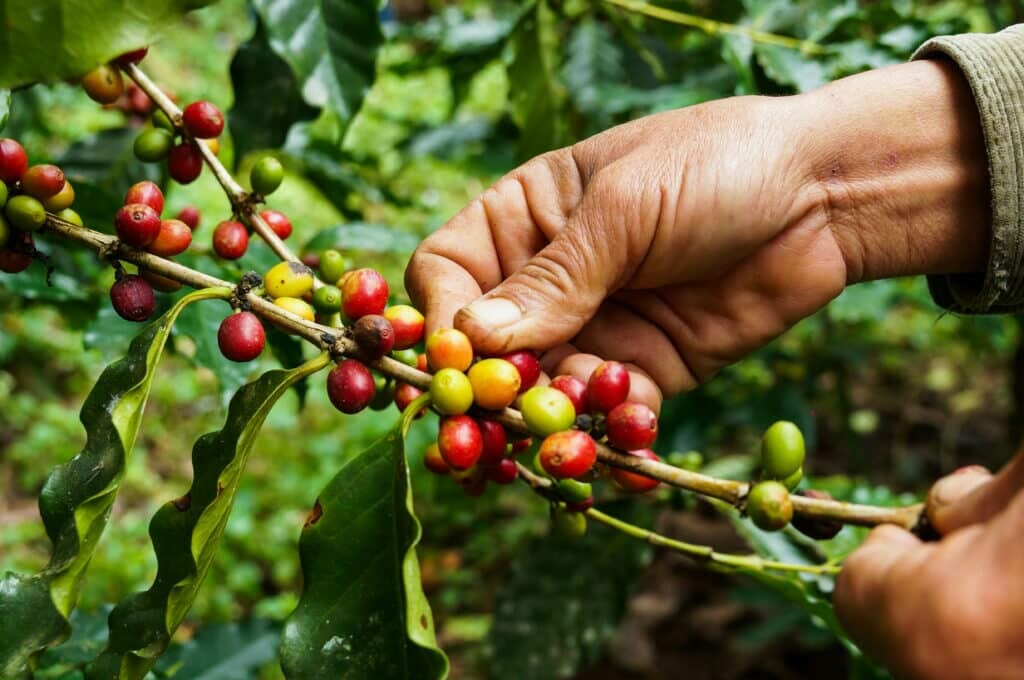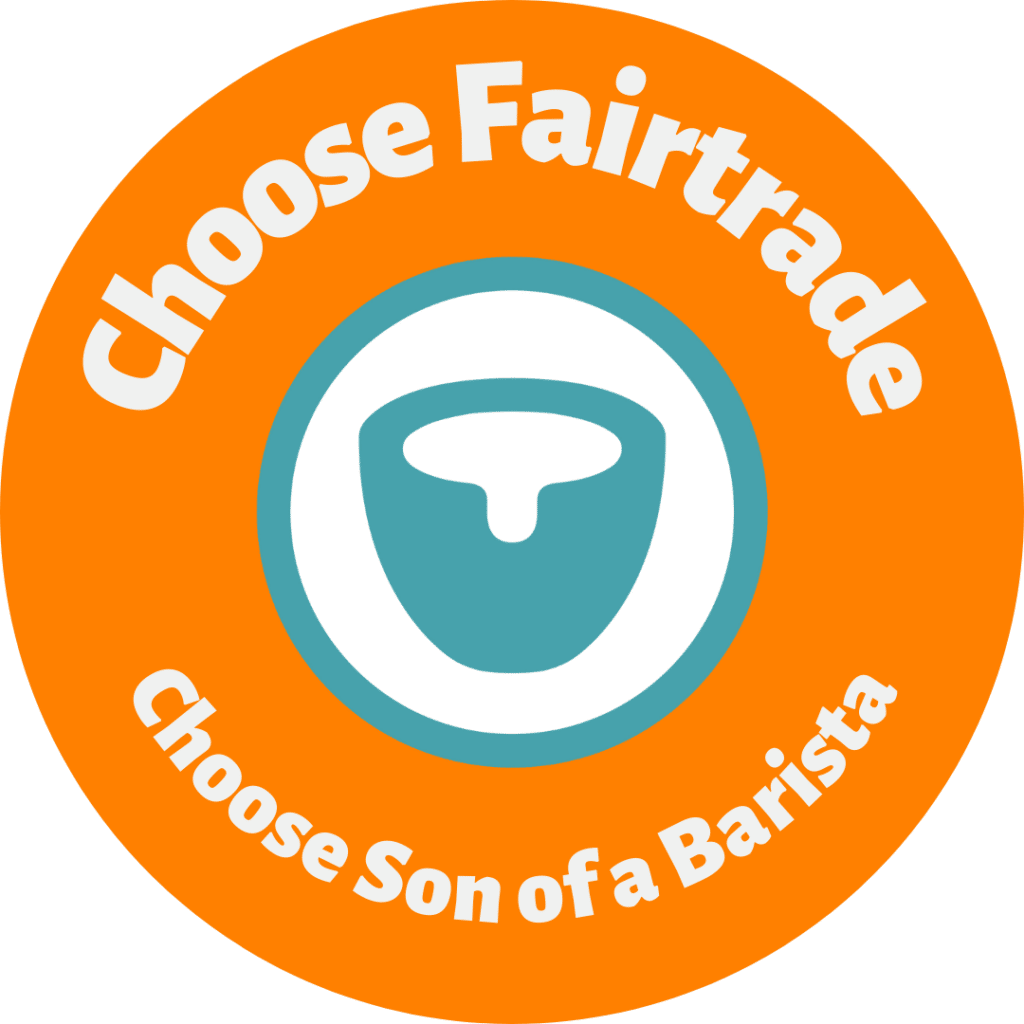Son of a Barista’s coffee is 100% Fair Trade Certified but what does Fair Trade Certified actually mean? We’re exploring that question in this blog so read along!
Everyone’s heard the term Fair Trade. The words conjure images of coffee, chocolate and happy farmers with fresh produce advertised on a product. Most consumers have an idea that Fair Trade products are probably a good choice, but maybe they’re not sure exactly why. And with 86% of millennials looking for responsibly sourced products, Fair Trade seems like a no brainer. But what exactly is Fair Trade and is it really more than just a marketing ploy to get consumers to feel good about their purchases?
The reason for some of the confusion is that the term Fair Trade can be thrown around as a blanket term for alternate methods of commerce – even those as simple as tourists buying from local artisans and bringing the goods back home to sell. But let’s start at the beginning.
The Fair Trade movement began as early as the 1950’s when Europeans and Americans traveling to different countries observed that local artisans and farmers were struggling to cover the cost of their businesses. Most of these travelers would purchase some of those products and return to Europe or the US to sell them for a higher price, then bring the profits directly back to the artisans and farmers.
But clearly that process can be open to exploitation, without anyone able to confirm if the profits really went back to workers or more cynically, straight into the pockets of the tourists who brought them back. That’s why in the 1990’s, when Fair Trade USA founder Paul Rice was working with coffee farmers in Nicaragua, he wanted to get involved in creating standards that could govern the way that Fair Trade was monitored across the globe. This work served as the foundation for what we now know as Fair Trade Certification.
Rice returned to the US and founded Fair Trade USA in 1997, bringing the certification model to large companies who sold commodity goods like cocoa, bananas and tea. The organization began to educate corporations on why it was important not only to sell more ethical products under Fair Trade terms but also to educate consumers by using the Fair Trade Seal on products to increase awareness.
That certification process is complex and rigorous, generally taking anywhere between 6-9 months for a producer to achieve Fair Trade Certified status.Then Fair Trade USA does a pre-assessment of the factory through an introductory webinar and in-person meetings with the workforce and management. They enlist an unbiased third-party auditor to evaluate performance against the Fair Trade standards, finally awarding certification to compliant factories. This audit process is repeated annually, and the Fair Trade USA Factory Services team provides in-country support to ensure everything runs smoothly on an ongoing basis.
Another piece the field workers help the Fair Trade committee with during that process is to open a bank account that will serve as the “Premium Fund” which will go towards a community project agreed upon by the Fair Trade committee – a combination of management and members of the workforce.
Deciding how to invest those premium funds depend on the needs of each particular workforce and the issues/barriers they face. Something as simply as giving every employee a bicycle can be transformational. This is something a group in India did, allowing workers’ families to more easily get groceries, take their kids to school and commute to work.
In one factory in Sri Lanka, workers elected to build a nursery school right next to the factory. It was the first time children there had access to school under the age of five, plus it gave the parents more time with their children since the school was so close to where they worked. Other groups have invested in things like health insurance, gasoline vouchers, health and sanitation kits, subsidized food at the factory or rebuilding homes after a devastating earthquake. One factory even funded a summer camp.

Fair Trade Impact
Today, Fair Trade Certified products originating in 51 countries (and growing) are being sold in the United States and beyond. Those purchases unlock transformative social, environmental, and economic impact for communities that need it the most, which in turn creates more resilient supply chains.
Everyone deserves to prosper in a sustainable community. The Fair Trade Certified impact model protects human rights, enables sustainable livelihoods for farmers, fishers, and workers, and creates more resiliency – in both communities, as well as supply chains. More than $931 million in financial benefit has been delivered to producer communities between 1999-2021.
Fair Trade Strengthens Communities
Community investment is a pillar of fair trade impact. Through the Community Development Fund, farmers, workers, and fishers democratically determine their biggest areas of need and what to invest in. Many of the benefits of fair trade are a result of this. Gender equity requirements create leadership opportunities that would otherwise not exist. Investments are consistently made in areas that both positively impact the community (like access to healthcare and education) as well as productivity (including quality and production improvements).
Fair Trade Protects Workers
The rigorous standards and certification model for Fair Trade Certified products ensure that farmers, workers, and fishers are educated on their rights and engaged, especially on workplace safety and protection. It protects human rights and grants access to safe environments, additional capital and resources, and education along the Fair Trade Certified journey. There are 1.6 million Fair Trade Certified Producers across 51 countries with 700+ Social, economic, and environmental protections.
Fair Trade Changes Industries
Fair Trade Certified products help change industries and empower communities by setting a high bar on responsible business practices and developing ethical and transparent supply chains – all in compliance with ISEAL’s best practices.
What Is Fair Trade Coffee?
A Fair Trade Certified coffee means that the coffee has been audited throughout the supply chain to meet certain sustainability and labor standards.
How Does Coffee Become Fair Trade Certified?
Coffee sold through a Fair Trade organization also makes its coffee grower and producers pay a minimum price, higher than the commodity price of coffee. There are several organizations (such as Fairtrade America, Fairtrade International, and Fair Trade Certified) that certify coffee as Fair Trade.
What is Fair Trade Coffee Versus Direct Trade Coffee?
Direct Trade is a catch-all term for sourcing processes that get a coffee roaster as close to dealing directly with the coffee farmer as possible. While Fair Trade and Direct Trade might have similar goals of fairly paying coffee producers in the end, the Fair Trade label is a third-party certification while Direct Trade is more of an ideology. If you see a Direct Trade logo on a bag, it’s only “certified” by the coffee roaster, based upon their specific internal definition of Direct Trade coffee.
Why Does Fair Trade Certified Coffee Matter?
The Fair trade movement brings attention to the fact that coffee farming is a risky endeavor from which farmers often struggle to make money. And as the coffee market is currently facing a price crisis, a Fair Trade certification is one way to ensure that every farmer is paid a Fair Trade premium that is above base commodity price, hopefully bringing them closer to earning a sustainable living.
Should You Only Buy Fair Trade Certified Coffee?
Coffee drinkers who buy exclusively certified Fair Trade ensures a minimum amount of compensation at a certain point in the supply chain.
Why is Fair Trade Certification needed today?
Throughout the global south, family farmers follow generations of tradition to cultivate food products we enjoy every day. Yet many family farmers in the developing world don’t receive a fair price for their crops. These isolated rural communities lack direct market access, often selling their premium crops below the cost of production to local middlemen who misrepresent global prices. This cycle of debt forces many to abandon their land and years of agricultural heritage, destroying the social and cultural fabric of these communities. When farming communities in the developing world suffer, the whole world suffers – forced immigration, inferior-quality products and large-scale farming methods that often compromise the environment.
- Producers: Beyond receiving a fair, stable price, fair trade also empowers producers to invest in their organizations, improve their communities and protect the environment.
- Consumers: Fair trade certification enables consumers to “vote with their dollar” by providing an independent guarantee that products were produced and traded fairly. We all lead busy lives, and we want to do the right thing, but we’re busy. What if we could make a positive impact just with the purchases we make every day? And not have to go out of our way to do this? That’s the compelling proposition of fair trade.
- The Earth: Fair trade certification requires and rewards environmentally sustainable farming practices that protect farmers’ health and preserve valuable ecosystems for future generations, and provides the resources and technical assistance needed for organic certification.




